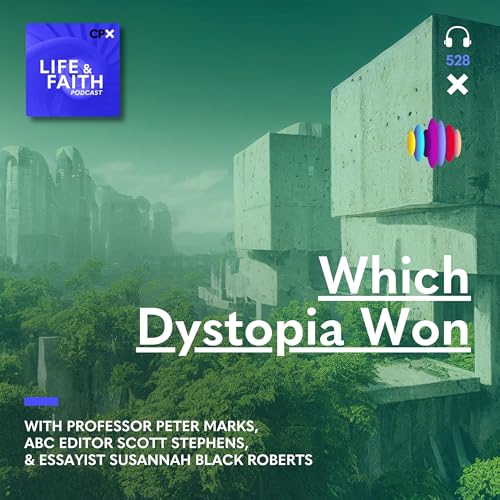
Which Dystopia Won
No se pudo agregar al carrito
Add to Cart failed.
Error al Agregar a Lista de Deseos.
Error al eliminar de la lista de deseos.
Error al añadir a tu biblioteca
Error al seguir el podcast
Error al dejar de seguir el podcast
-
Narrado por:
-
De:
How Orwell’s Nineteen Eighty-Four, Huxley’s Brave New World, and Lewis’ That Hideous Strength predicted our current world disorder.
---
Which vision – of a world gone sour – has proved prophetic?
Is it George Orwell’s Nineteen Eighty-Four, which introduced terms like “Big Brother”, “doublethink”, “thoughtcrime” to our vocabulary?
Or Aldous Huxley’s Brave New World, where people exchange freedom for pleasure ... and everyone is too busy having a good time to worry about being manipulated?
Or is it C. S. Lewis’ That Hideous Strength: the third book of Lewis’ “Ransom trilogy” or “Space Trilogy”, published 80 years ago this year?
In this episode of Life & Faith, we hear from three expert fans about how each book anticipated our times.
Peter Marks, Emeritus Professor in the Discipline of English and Writing at the University of Sydney, walks us through why Orwell’s Nineteen Eighty-Four is “news that has stayed news”, and how Apple, once the upstart defender of individuality, has become a Big Brother-type figure. Peter has written the books Imagining Surveillance: Eutopian and Dystopian Literature and Film and George Orwell the Essayist: Literature, Politics and the Periodical Culture.
Scott Stephens, Editor of ABC Religion & Ethics, and co-host with Waleed Aly of the podcast The Minefield, talks about the endless entertainment of Huxley’s Brave New World, and why he thinks Huxley could have invented the recommendation algorithm.
And Susannah Black Roberts, an essayist and editor of Plough Magazine in the United States, explores how C. S. Lewis’ That Hideous Strength anticipated the transhuman ambitions of Silicon Valley, and why “staying human” is a way to survive the looming age of AI.
Explore
Why Peter Marks believes Orwell’s Nineteen Eighty-Four is “news that has stayed news”.
Matthew Purdy, in The New York Times, arguing: “We are all living in George Orwell’s world now”.
Episode of The Minefield podcast where Scott Stephens and Waleed Aly discuss Ray Bradbury’s Fahrenheit 451 and being on the brink of a world without books.
Susannah Black Roberts contributed an essay to this collection of writings on the Ransom Trilogy – Life on the Silent Planet: Essays on Christian Living from C. S. Lewis’ Ransom Trilogy
George Orwell’s review of Lewis’ That Hideous Strength
The Rolling Stone article by Miles Klee arguing “People are losing loved ones to AI-fuelled spiritual fantasies”
“They asked an AI


